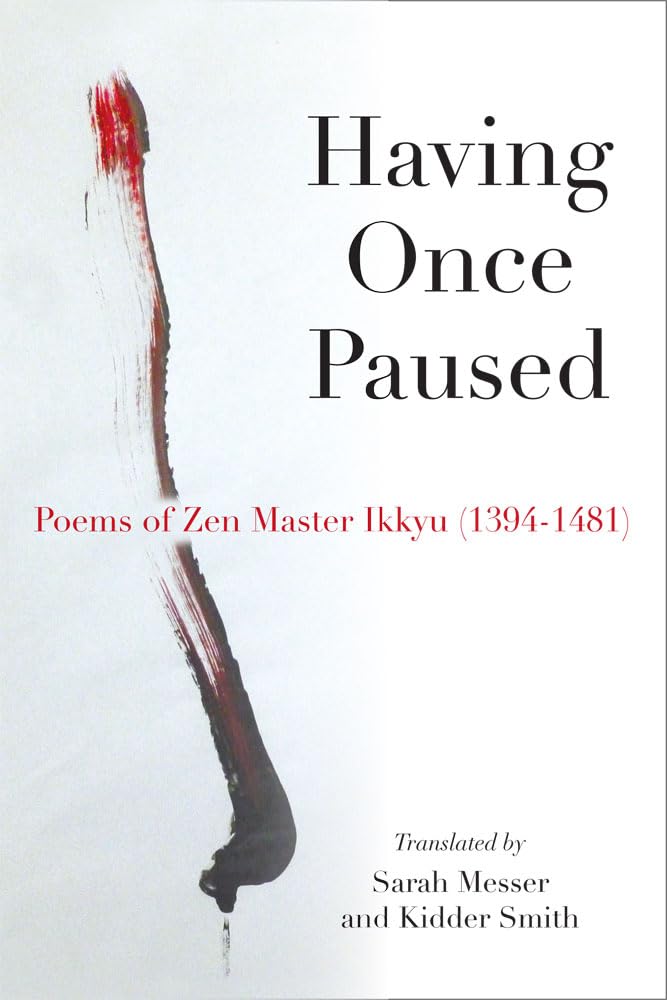
Having Once Paused: Poems of Zen Master Ikkyu
The influence of Zen Master Ikkyū (1394-1481) permeates the full field of medieval Japanese aesthetics. Though best known as a poet, he was central to the shaping and reshaping of practices in calligraphy, Noh theater, tea ceremony, and rock gardening, all of which now define Japan’s sense of its cultural tradition. Ikkyū is unique in Zen for letting his love of all appearance occupy him until it destroys any possibility for safety or seclusion. In his poetry, he turns the eye of enlightenment to all phenomena: politics, pine trees, hard meditation practice, sex, wine. A lifelong outsider to religious establishments, Ikkyū nonetheless accepted Imperial command to rebuild his home temple, Daitoku-ji, destroyed in the civil wars. He died before that project was complete.
The poems in this collection express the unborn bliss of Ikkyū’s realization and equally his devastation at the horrors of this world. They are peopled with ancient Chinese poets, cantankerous Japanese Zen Masters, contemporary warlords, and his lover Mori, a blind musician who lived with Ikkyū the last eleven years of his life. All of this is his Buddhism. His awakening outshines the small idols of reason, emotion, self, desire, doctrine, even of Buddhism itself.
extracts from the book
The story:
Once a mountain spirit traveled to the southern rice terraces, answering the call of the King of Chu. There he dreamed her in the damp air, a shaman calling his spirit-lover from Shaman Mountain. She said, “I am just a guest here. I am the southern slope of the mountain. I brought you a pillow and mat.” For one night they lay together as lovers. She never returned.
Her yin is a darkness: a reverie, the moon, companion to yang, which is the sun, his brightness. Her perfume: narcissus, called “the flower of nymphs.” The poet Huang Tingjian wrote:
Rising in the waves, the nymph wears dusty stockings.
Atop the water, abundant, she follows the footsteps of the tiny moon.
The poem:
A Beauty’s Dark Yin Has the Scent of Narcissus
Behold the terraces of Chu, and now climb them.
Half a night, sad colors of dream face on the jade bed.
The flower gives way beneath the branch of the plum tree.
Rising on the waves, the nymph wraps round my hips.
* * *
the story:
The Buddha was considered complete and perfect, the only refuge, until the Third Zen Patriarch Sengcan wrote the “Inscription on Confidence in Mind,” overthrowing the dependency on Buddha. Don’t rely on Buddha, Buddha is only mind, one’s own mind, there is nothing external to achieve. His inscription begins:
The very dao is without difficulties,
Only it rejects choosing.
Just don’t hate and love:
Piercingly clear!
And then that clear mind was considered complete and perfect, the only refuge, until Zhaozhou rose up:
Zhaozhou instructed the assembly, saying “‘The very dao is without difficulties, only it rejects choosing.’ Yet as soon as there is speaking, that is ‘choosing,’ that is ‘clarity.’”
There is no Buddha to be confident in, no mind to speak of, no words to speak with, and no clarity. There is nothing internal to achieve. And so the kōan commentator elaborates, “To say ‘the very dao is without difficulties’—that’s a mouthful of hard frost.”
And this silence was considered complete and perfect. Yet still, plum trees blooming in the snow.
The Song dynasty hermit Lin Bu spent twenty years in a cottage on Solitary Isle. Plum trees were his wives and concubines, the cranes his children. He wrote of them:
Spare shadows slant
the waters pure and shallow,
Dim fragrance floats
the moon at yellow dusk.
the poem:
The Waters of Her Sex
A dream deceives me: the beauty Mori in the Royal Gardens.
News of opening flowers on her pillow, plum blossoms confident in mind.
Mouth full of pure fragrance, of pure shallow water.
In yellow dusk, the moon-color of sex, how could I make a new song?